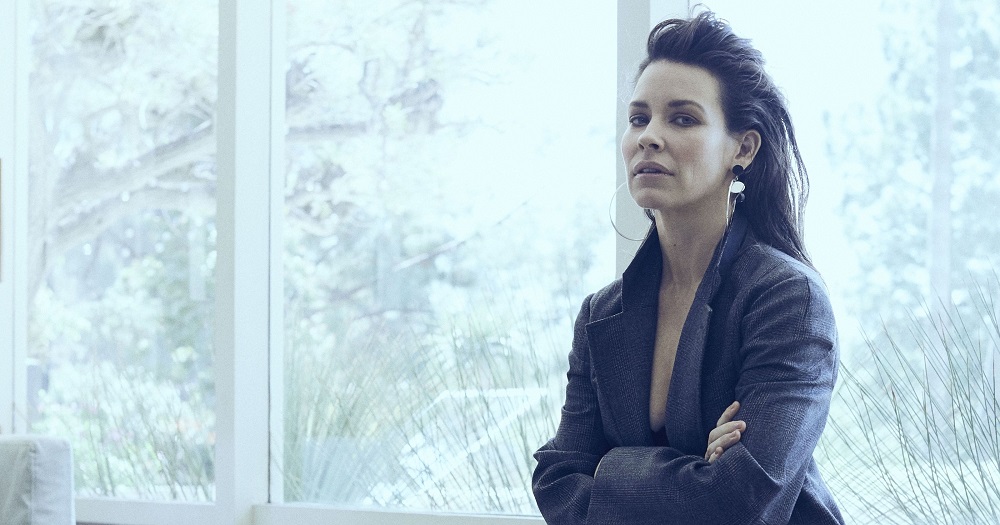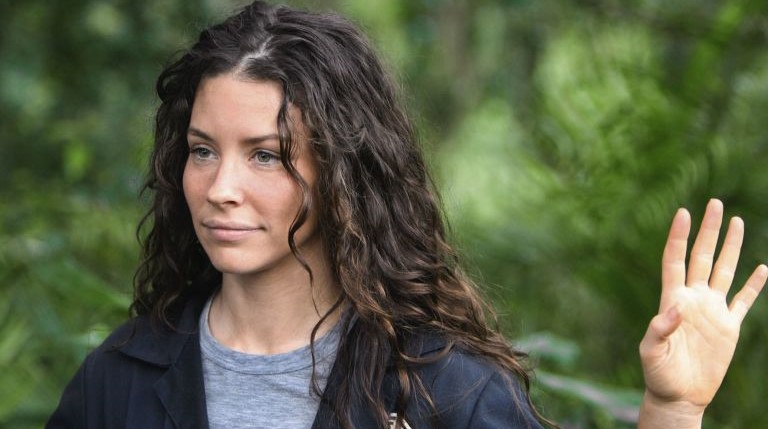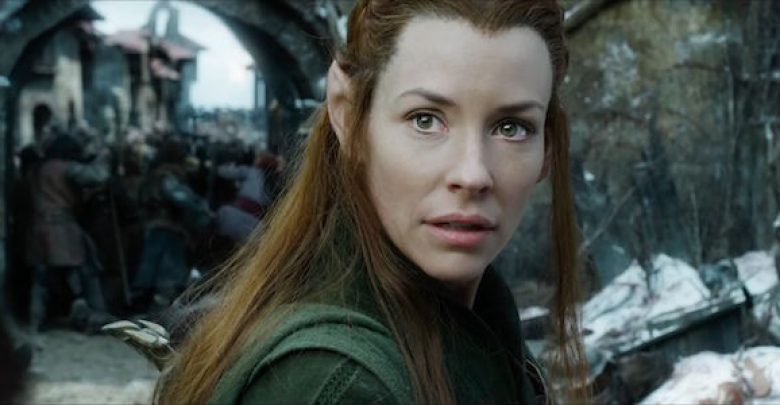
President Donald Trump may have begun making jabs at the #MeToo movement and women empowerment, but that’s not keeping actresses like Evangeline Lilly from remaining silent on the movie set. In fact, she made a concentrated effort to make sure to do that.
The “Ant-Man” sequel may be about tiny superheroes, but the film is making a big statement about female empowerment by featuring Evangeline Lilly’s The Wasp not only in the title but giving her a larger stake in Marvel’s sprawling movie franchise.
“Ant-Man and The Wasp,” the 20th film in the Marvel cinematic universe that includes “Black Panther,” ″Iron Man” and “Avengers: Infinity War,” is the first one in the series to include a female character in a title role. The prominence of The Wasp, a character who has major roles in the “Ant-Man” and “Avengers” comic books, comes after years of fan anticipation for a female Marvel superhero to get her own film. Scarlett Johansson has expressed her desire to see her character, Black Widow, get a standalone film, but Marvel Studios has kept her primarily in its marquee “Avengers” films.
“You know, I’ve asked myself the same question: Are we making a mountain out of a molehill?” Lilly said during a recent interview when asked about being featured in a Marvel film’s title. She said after considering it more closely, “‘No, actually, this is kind of a big deal, and this is about time.’” The film is the sequel to 2015′s “Ant-Man,” which introduced Paul Rudd as a thief enlisted by Michael Douglas’ Hank Pym to become a do-gooder. The original earned more than $180 million in North America and $500 million at the global box office. The sequel is the third Marvel Films release this year, but it largely steers clear of the developments in the blockbuster “Avengers: Infinity War.”
The Wasp was a comic book favorite of director Peyton Reed, who teased her appearance in future Marvel films with a cameo of her supersuit at the end of “Ant-Man.”
He said it was important that The Wasp be a fully-formed hero and not bound by stereotypes.
“I worked really closely with Evangeline, and we talked about, ‘Now we’re going to have a chance to make a fully formed hero, and we want her to be as dimensional as possible. And we don’t want her to be a hero who is always glammed up with hair and makeup. We wanted her to be a little sweaty. And we want her, like, when that helmet comes off, her hair is in a ponytail, because that’s the practical thing you would do,’” Reed said.
“I wanted her to have a signature style that little girls, like I was when I was a feminine, girly little girl, would be able to fall in love with,” the actress says of her character, the first in the Marvel Cinematic Universe to get equal billing with a man.
Lilly’s role isn’t the only prominent female character in the film. Hannah John-Kamen plays Ghost, a villain bent on sowing discord among powerful institutions, in a role that was initially written for a man.
“It’s amazing, as a female, to play such a strong character … so that people can look up to that and see that, ‘Yeah, this is a progression,’” said John-Kamen, who is in her biggest role yet after starring in the Canadian sci-fi series “Killjoys” and having small roles in “Ready Player One” and “Tomb Raider.”
“There is so much more going on in this film that represents female energy, that represents female stories, that represents female struggle and that represents female power,” Lilly said. “In this film, I’m very proud to say I recognize authentic female power in that it’s powerful to be vulnerable, it’s powerful to be elegant, it’s powerful to be graceful and nurturing and kind and forgiving and compassionate and generous … things that tend to be typically categorized as weaknesses.”
Marvel’s first film based solely on a female superhero will be the 1990s’ set “Captain Marvel,” which stars Brie Larson in the title role and is slated for release next year.
“Ant-Man and The Wasp” is the first Marvel film to be released after April’s “Infinity War,” which upended the franchise and set up a fourth “Avengers” film that will be released next summer.
The “Ant-Man and The Wasp” cast are keeping any secrets about that film closely guarded. During a recent interview, Rudd started to answer a question about his character’s role going forward in Marvels films. “A funny story, because, you know, in ‘Avengers 4,’” he said, before pretending to be hit in the neck with a dart and falling out of his chair.
Douglas said before his first Comic-Con panel about the original “Ant-Man,” he underwent secrecy tests — and thought he might have to give blood — to prove that he could keep from spoiling that film’s secrets. While he thought it was a bit much at the time, Douglas said he’s grown to appreciate what Marvel Films has done and the care they take to avoid spoilers for fans.
“Marvel has done this amazing job of creating buzz just for people not knowing what exactly is going to happen,” Douglas said.
“We do not want to spoil things for people. There are people out there hired to try and find things out,” Rudd said. “It’s an amazing, intense thing to be a part of.” Marvel fans have been calling for a female superhero film for years. At what point in your casting did you know that you would actually be getting in the suit and fighting?
When they cast me in the first Ant-Man, I knew that if the first film was a box-office success, then that would mean I would get to put on a suit. So there was probably no one more invested in the box-office numbers of Ant-Man than me. Once the film was successful enough to warrant a second, and I knew that that was going, I still didn’t know that Wasp would be getting equal billing with Ant-Man. So that came as a surprise later: I got a surprise email with nothing but a JPEG of the title card. And that was how they told me. Pretty cool.
You’ve said before that you don’t think female power in entertainment comes from “embracing or copying violent men.” How did you bring that perspective to this film?
Even for the first film, it was very important to me that Hope be an extremely empathetic and compassionate person. And I still did that while having that stereotypical or archetypical [quality] of femininity of being nurturing, compassionate, empathetic. Men can, of course, be compassionate or feminine, but femininity is at the core of what is disrespected in the patriarchy, so it was important to me to always push for feminine qualities to be apparent when she is dealing with situations — how she emotionally reacts to them, [for instance].
In her fight scenes, as trivial as it might seem, I really pushed and fought for her to fight with elegance, grace and femininity. She moves differently than a man. I wanted her to have a signature style that little girls, like I was when I was a feminine, girly little girl, would be able to fall in love with, emulate and relate to in their own movements.
When we did Ant-Man, I had to study a little bit of Muay Thai and MMA-style fighting. And MMA-style fighting is distinctly masculine, it’s got a very masculine posture and a very masculine attack, and that was so difficult for me because I don’t move that way naturally. I really wanted to change that in this film. I wanted to move the way my body wants to move, as a more graceful, feminine woman.
There was an interview with you that went viral in which you talked about your costume being more comfortable than men had led you to believe.
That got so viral that it was sent back to me by people I know. I have friends, agents, everyone’s sending me that interview.
Were there other times on set where you felt you had to offer a perspective of your gender that hadn’t been offered as much before?
I always tried to offer a perspective of my gender that maybe wasn’t offered as much because I live in worlds that are boys’ clubs. In the sci-fi/fantasy space of Hollywood, it’s even more predominately male than in some of the other dramatic spaces, so I’m used to trying to be that voice in the room.
But also, admittedly, something that I really challenged myself with is that it’s very easy for me to say to myself, “You know what, let the boys be boys, let them tell their stories, let them play with their toys, don’t get in the way with your perspective, because you’re just being irritating.” Because I think there is an unconscious message for little girls and women that when you challenge men in the midst of doing something juvenile or fun, then you’re a heavy, a killjoy, a ball and chain. And all my life I grew up thinking, “I swear I won’t be that way, I’ll be cool, I’ll be fun, I’m going to be the chick that can hang with the guys.” And I really challenged myself on this film to shut out all of those critical voices, and the male pressures to conform and to really stand up and be a female voice in this world. And I wasn’t always successful. I still feel that fear of being of being this irritatingly school-marm type of thing.
But one of the things that I did see when I watched the film is that they really, really heard me and honored my requests. Because I didn’t want Hope to be that in the movie. It would be so easy with her nature, personality and drive to get her mother for her to become the motherly figure that’s constantly scolding the juvenile boys, saying, “Now boys, let’s focus, let’s stop goofing around.” I was just was terrified of the idea of this female superhero who’s meant to represent a modern woman being some kind of horrible stereotype of “mommy.” So I really voiced that a lot, and every scene where there was any potential for that, I would push up against that and say, “Let’s pay attention to this. Let’s make sure we represent a woman who can also smile and have a little fun, can understand that there can be levity in moment of severity, that gets a joke, that isn’t a heavy.” Because you often see female characters — especially in the superhero world — being super-serious characters, and the boys get to have all the fun. And I really felt heard, and I feel like when you see the movie, you’re going to see that. And I think it’s really fresh and really fun to see a woman who knows how to take a joke and roll with things, but also can get the job done.
Viewers haven’t seen you in a ton of leading roles like this since Lost, although you’ve been in several movies. What kind of parts were you offered after the show — because that show had such a huge cultural shadow to it — and how did they work with your professional goals?
I don’t know if you’re familiar with my journey with acting, but it’s been a unique one, it’s not your typical story. Basically, by accident, my first speaking role in film or television was Lost, and so I was instantly launched into international stardom, and that was really uncomfortable for me. I instantly balked, didn’t know how to deal with it and felt very uncomfortable after that situation. I ended up deciding to retire after I finished Lost. I did a film called Real Steel with Hugh Jackman and then I walked away. I said, “I’m done, I’m never doing this again.” I had a baby, I was writing scripts, I had a quiet little life, and two years later — and I mean, throughout those two years, I had no contact with Hollywood at all — I got a covert call from Peter Jackson, who I knew through my relationship with Dom[inic Monaghan] back in the day, and he said, “Nobody in Hollywood seems to be able to reach Evangeline, but we want to get a hold of her because we want to cast her in this film.” And I was so torn because I had genuinely retired, I thought I was done, but I really wanted to do the movie. The little 13-year-old girl in me was like “I get to be a woodland elf? What?”
I made a decision and I decided to go do the film. I had a wonderful time making that movie: One of the highlights in my life was living in New Zealand for that year and being a part of that family. That helped opened my eyes to the fact that, OK, this job can be a joy, it’s just a matter of how you approach it, and what you do with it, how much I put myself out there, and to a certain degree, how much I work. And so as I was finishing press for The Hobbit, that’s when I got the call from Marvel, and I thought, “I just need to either draw a very firm line in the sand and say I’m done, or I need to just make my peace with the thing, find a way to be happy and do it in a way that makes me feel comfortable and satisfied.” So that’s what I ended up deciding. I just thought, “Well, I’m a smart lady. I can figure this out. I’m going to figure out a way to do this and be happy.” And I am, I’m very happy, I’ve had a wonderful time promoting this movie, and I’ve had a wonderful time talking to people about things I care about because this movie brings up so many cool issues.
It’s hard to find many other women who leave to have children and then can break back into the industry even if they want to. Is that something you feel you can speak to at this point?
First of all, I just want to be very open and honest about how difficult it is for me to strike that balance. I don’t think it’s easy for any mother who works. And I’ve grappled with this a lot: Is it harder for women to work and be a mother than it is for fathers to work and be fathers? I don’t know, but it certainly seems that way in my observation. I don’t know if that’s because we gestate children for nine months and have a maternal bond, I don’t know if that’s because we are socialized to be the primary caregiver, or [something else], but it’s hard. I make no claims that it’s easy.
And then it’s hard to get work after children. Honestly, I don’t know why I am so fortunate and I just count my blessings and I thank my lucky stars and I also constantly have in the back of my mind the notion that I’m 40 next year. I mean, roles are going to become less and less available to me. I am no longer going to be able to do the roles that are traditionally done, and potentially my career’s going to look very different or slow down. But I’m OK with that, I’m really comfortable. I don’t need to work for my identity, it’s not my source of joy. I work to live, I don’t live to work.
Have you heard anything about a potential Ant-Man 3 yet, and whether you’ll be in it, or anything at this point?
At this point, my understanding is that we need to get butts in the theater seats again if we’re going to have another film. So if everyone gets out and watches it, then I would assume we’ll have another one. I hope we’ll have another one, because I really want to do it again, but I don’t know right now.
Where do you want to go next with your career?
My first passion is writing. And I began publishing a children’s book series that I’m re-launching right now: I published a prequel series to see how that would be received. That was well-received, so now I’m launching the full series.
But I have had this TV show up my sleeve for a long, long time that I’m interested in producing and maybe working as a writer on and performing in, and I think that’s going to be the next thing that I really dedicate a lot of time to. I have a film project that’s in the works right now and we’re just waiting on financing, so I can’t really say what it is until it’s real, but I’ll be working with wonderful and talented people, and that means a lot to me.
One of the reasons why I have such a peace with my age and where I’m at in my career is that what I really want to do is create my own content. I have a lot of stuff that I want to say. I was that little girl that daydreamed my life away, and I still live in imaginary worlds in my mind all the time. The first thing I asked my manager when I hired him seven years ago was, “How do I get these worlds out of my head and put them on paper or on the screen?” That’s what I want to do.



